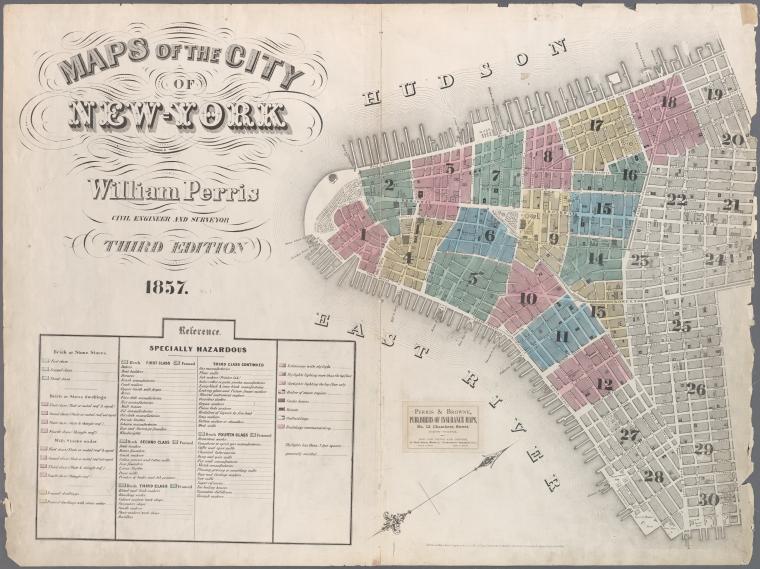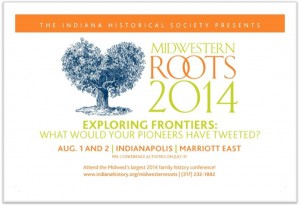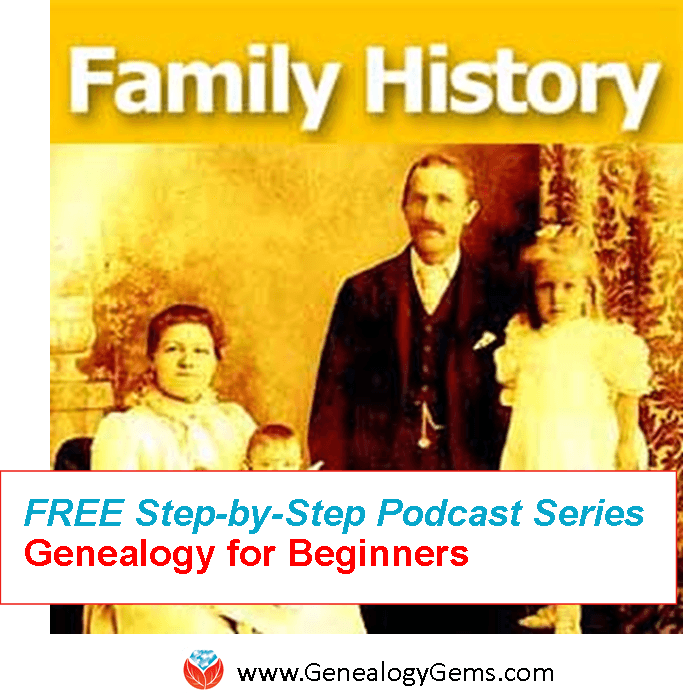by Lisa Cooke | Aug 8, 2014 | 01 What's New, Digital Archives, Google, Maps

Map of New York City, 1857. Click for full citation information.
Thousands of historical maps of New York City, the mid-Atlantic states and even the Austro-Hungarian empire (yes, really!) are now online–and they’re free.
The New York Public Library has published more than 20,000 historical maps dating from 1660-1922. They are free for public use, downloading, manipulating and publishing! A lot of the maps are from New York City neighborhoods, like the one shown here.
The author of a news item about the collection said this: “We can’t imagine too many people wanting to remix Gangs of New York-era property charts, but it’s hard to object to getting more geographic knowledge at no charge.” Well, we genealogists may not “remix” these old property maps, but we can certainly see the value in them!
Do you use maps in your research? Have you tried overlaying a historical map showing an ancestor’s home with a modern one on Google Earth? Learn more about using Google Earth in your genealogy research in this FREE video.
And if this post is interesting to you, you should also read this blog post about interactive historical maps of major cities (like New York City).
by Lisa Cooke | Sep 26, 2013 | 01 What's New, Findmypast, Irish, Newspaper
Got Irish roots? You may want to check out Findmypast.com’s new Irish Newspaper Collection, with nearly 2 million searchable historical Irish news

Glenarm Co Ireland
articles.
“Digitized from the collections of the British Library, the Irish Newspapers Collection on findmypast.com is a rich resource for genealogists in search of their Irish roots,” states a company press release. “The collection features six newspaper titles (both national and local) covering areas in Leinster, Munster, Connaught and Ulster, namely: The Belfast Morning News, The Belfast Newsletter, The Cork Examiner, The Dublin Evening Mail, The Freeman’s Journal and The Sligo Champion.
Each newspaper title covers different dates in Ireland’s history with articles from the pre-Famine era to post-Irish independence in 1926. For family historians, the newspapers contain valuable entries like advertisements, obituaries and letters to the editor which provide details on what local and national life would have been like in Ireland hundreds of years ago.”
The time period covered by these papers (1820-1926) includes the Great Famine that caused millions of Irish to flee the country for more fertile shores. Findmypast.com subscribers can access this collection as well as those with World subscriptions on all findmypast international sites.

Available at http://genealogygems.com
Still not sure how to use newspapers in genealogy research? My book How to Find Your Family History in Newspapers, available in both print and e-book formats, shows you how to get the most out of online (and offline) newspapers.
I wish you some old-fashioned Irish luck finding your family in newspapers and beyond!
by Lisa Cooke | Feb 17, 2014
Join Lisa at an upcoming event near you! Genealogy conferences, seminars, workshops, webinars, and more! Lisa speaks to audiences all over the world with dynamic, education, and entertaining presentations on the hottest topics in genealogy. Be enthralled and inspired...
by Lisa Cooke | Mar 26, 2014 | 01 What's New, Conferences
I have roots in Indiana and have longed to travel to Hoosier state to conduct some much needed genealogy research. So you can imagine how happy I  was to be invited to keynote at the upcoming Midwestern Roots 2014: Family History and Genealogy Conference being held August 1 and 2, 2014, Indianapolis, IN, at the Indianapolis Marriott East.
was to be invited to keynote at the upcoming Midwestern Roots 2014: Family History and Genealogy Conference being held August 1 and 2, 2014, Indianapolis, IN, at the Indianapolis Marriott East.
This year’s theme is a timely one: Exploring Frontiers: What Would Your Pioneers Have Tweeted? This conference promises to be a glorious melding of old and new with deep history sessions and the latest technology.
Here’s the scoop on the Midwestern Roots Conference:
Registration Opens March 26 with a $99 registration special price March 26-29, 2014.
Includes the two day conference and lunches.
Additional fee for banquet and some pre-conference activities.
Register online at www.indianahistory.org/midwesternroots or
call (317) 232-1882 from 10 a.m.-5 p.m. Thursday through Saturday during the special offer.
The Midwestern Roots 2014 Conference is your chance to get updated on the latest technology changes in family history research, resources and methodology, and I’ll be exploring that in my keynote Future Technology and Genealogy: 5 Strategies You Need. You’ll also experience:
• More than 30 stimulating lectures from nationally known speakers Warren Bittner, Lisa Louise Cooke, Joan Hostetler, Amy Johnson Crow, Thomas MacEntee, James H. Madison, Anne Gillespie Mitchell, Daniel S. Poffenberger, Curt B. Witcher and more
• The Great Google Earth Game Show presented by Lisa Louise Cooke (this will be an interactive, FUN, outside the box kind of session topped off with prizes!)
• Hoosiers and A New History for the Twenty-First Century presented by James H. Madison
• A Guided Tour of Ancestry computer lab taught by Amy Johnson Crow and Anne Gillespie Mitchell from Ancestry.com
• Genealogy Resources Library Workshop
• Writing, document preservation and photo preservation workshops
• Family History Market and Book Fair – open to the public
See you at the Midwestern Roots 2014 Conference!
by Lisa Cooke | Apr 1, 2014 | 01 What's New, Beginner, Family History Podcast, Vital Records

Listen to the Family History: Genealogy Made Easy podcast by Lisa Louise Cooke. It’s a great series for learning the research ropes and well as refreshing your skills.
Family History: Genealogy Made Easy Podcast
with Lisa Louise Cooke
Republished April 1, 2014
https://lisalouisecooke.com/familyhistorypodcast/audio/fh25.mp3
Download the Show Notes for this Episode
Welcome to this step-by-step series for beginning genealogists—and more experienced ones who want to brush up or learn something new. I first ran this series in 2008-09. So many people have asked about it, I’m bringing it back in weekly segments.
Episode 25: Using Civil Birth Records in Family History
In our last episode we covered marriage records. We finish up vital records in this episode by going back to the beginning: birth records.
There are two major categories: civil and church records. Today I’m bringing in professional genealogist Arlene H. Eakle, PhD, who will helps us to see the challenges we face and the success we can have locating civil birth records. (In Episode 26, Arlene will join me again to walk us through the world of church birth records.)
Here are some take-away tips from our discussion in this episode:
- When you start researching in a new area, learn when government birth records began to be kept. Every state and some cities began birth registration at different times. Today, in some states you order records before a certain date from the local government and more recent ones from the state vital records office. Do your research! Start with this Vital Records Chart from Family Tree Magazine.
- In the U.S., most government birth records were kept by the county, except in New England and independent cities. In the 20th century, the state took buy medication cart over jurisdiction of vital records in most states.
- Birth records often have the names of parents and child and the place and date of birth. You may also find parents’ birthplaces, marital status of parents and even the date of marriage.
- A single locale may have logged births in multiple sources, for example, for those who lived in or outside the city limits, or segregated records for blacks.
- The actual birth record may have been logged as part of a list of names on a columned form. Birth certificates are a modern thing!
- Some records have been digitized and indexed or microfilmed. Check the Family History Library catalog on FamilySearch.org first. If they have birth records, they’ll tell you whether they’ve been digitized or indexed on their site, or whether they’re available on microfilm.
- Of course, many birth records are also available on subscription websites like Ancestry.com, FindMyPast.com, MyHeritage.com and more. If you are a subscriber, check their online holdings, too.
- When ordering a birth record from a government office, they may type up a certificate to send you. That’s nice, but also ask for a photocopy of the original birth entry or record. There’s often more on the original record than the certificate—and you’ll minimize errors by looking at the real record.
Arlene H. Eakle, Ph.D., is the president and founder of The Genealogical Institute, Inc. and a professional genealogist since 1962. She holds both MA and Ph.D. in English History and an Associate degree in Nursing.




 was to be invited to keynote at the upcoming Midwestern Roots 2014: Family History and Genealogy Conference being held August 1 and 2, 2014, Indianapolis, IN, at the Indianapolis Marriott East.
was to be invited to keynote at the upcoming Midwestern Roots 2014: Family History and Genealogy Conference being held August 1 and 2, 2014, Indianapolis, IN, at the Indianapolis Marriott East.